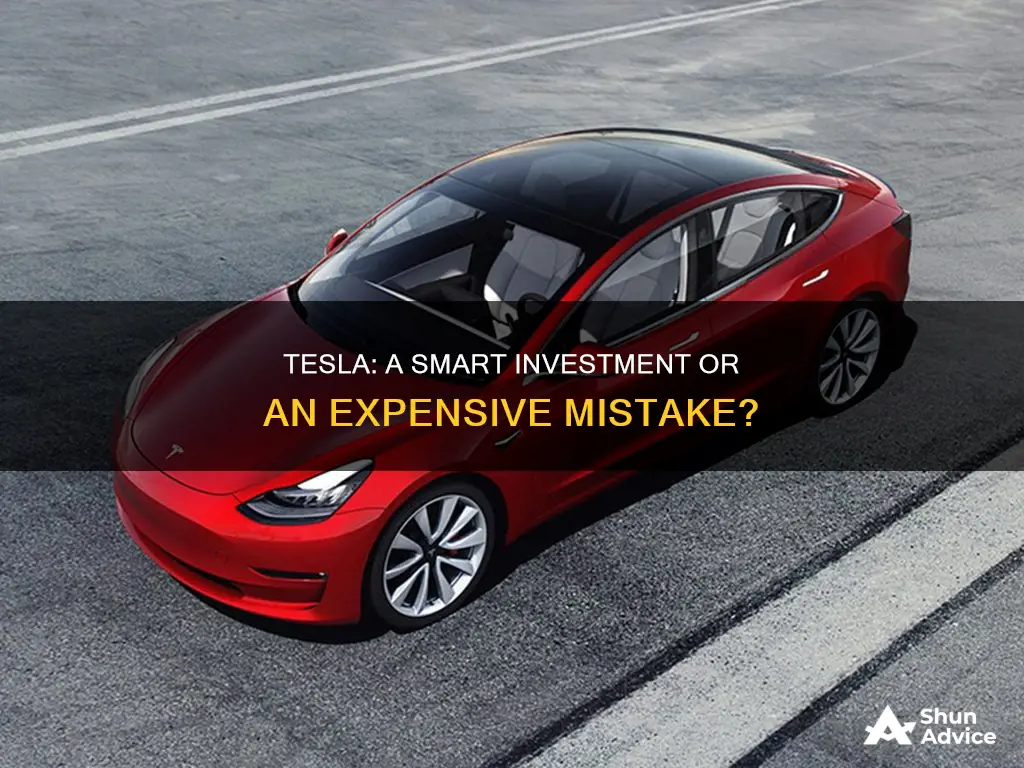
Is buying a Tesla a smart investment?
Tesla has become a household name, and its stock market performance has been impressive over the years. But is it a smart investment? This article will explore the pros and cons of investing in Tesla, including the company's history, recent financial performance, and future prospects, to help readers make an informed decision about whether to add this electric vehicle manufacturer to their investment portfolio.
What You'll Learn

The pros and cons of Tesla's stock price
Pros
- Tesla's stock price has seen rapid growth over the last few years. Between 2019 and 2021, the stock price increased by 740%.
- Tesla is the leader in the electric vehicle (EV) industry, which is expected to grow as demand for EVs increases.
- Tesla has a strong brand and benefits from cost advantages due to its efficient manufacturing capabilities.
- Tesla has an economic moat, a competitive advantage that helps protect its market position.
- Tesla has grown its business massively over the last few years, with a 435% increase in vehicle deliveries between 2018 and 2022.
- Tesla has a history of successful innovation and disruption in the auto industry.
Cons
- Tesla's stock price is highly valued, with a price-to-earnings (P/E) ratio of 78 as of November 2023. This means that the company's net income would need to increase significantly for investors to avoid losing money.
- Tesla is facing increasing competition from domestic and international EV companies, which could chip away at its market share.
- Tesla's new business lines, such as autonomous driving software and energy products, have not been successful so far.
- Tesla's stock price is highly dependent on the performance of its CEO, Elon Musk, who also runs other companies, including Twitter.
- Tesla's margins have been declining, and the company has had to lower prices due to economic headwinds.
Planning for a Peaceful Retirement: Strategies for Late Starters
You may want to see also

The impact of Elon Musk's ventures on Tesla's value
Elon Musk's ventures have had a significant impact on the value of Tesla, the company he leads as CEO. Musk's involvement with Tesla began in 2004 when he became an early investor and chairman of the company. Since then, he has played a pivotal role in shaping Tesla's direction and growth.
One of the most notable impacts of Musk's ventures on Tesla's value is the "Tesla Effect." This term refers to the profound influence that Tesla, under Musk's leadership, has had on the automotive industry. Tesla disrupted the market by producing sleek, high-performance electric vehicles (EVs) that challenged conventional notions about electric mobility. This compelled established automakers to accelerate their electrification efforts, fostering healthy competition and providing consumers with more options. As a result, Tesla's success and innovation have driven the industry's transition towards sustainable transportation.
Musk's ambitious Gigafactory initiative has also been a key factor in Tesla's success. These massive manufacturing facilities enable the company to produce batteries and vehicles on a large scale, driving down costs and making electric vehicles more accessible to a wider audience. Additionally, the Gigafactories' use of renewable energy sources contributes to Tesla's commitment to sustainability.
Furthermore, Musk's focus on technological advancements, particularly in battery technology and autonomous driving, has kept Tesla at the forefront of innovation. The company's introduction of advanced battery technology and an extensive Supercharger network addressed "range anxiety," a significant barrier to electric vehicle adoption. Musk's ventures, including SpaceX, have also inspired and influenced Tesla's pursuit of cutting-edge technology.
However, some of Musk's other ventures have had a more complex impact on Tesla's value. For example, his acquisition of Twitter in 2022 led to a drop in Tesla's stock market value. Additionally, some of Musk's controversial statements and actions on Twitter have sparked criticism and negatively impacted Tesla's reputation.
Overall, Elon Musk's ventures have had a significant impact on the value of Tesla. His innovative approach, technological advancements, and disruption of the automotive industry have driven Tesla's success and influenced the adoption of electric vehicles. However, some of his actions and statements have also led to fluctuations in Tesla's value and reputation.
ETFs: Invest Now or Later?
You may want to see also

The future of the EV market
Research firm IHS Markit forecasts that the US demand for electric vehicles, including hybrids, will rise to 1.28 million by 2026, with more than 130 models from 43 brands offering electrified propulsion systems. However, two-thirds of these sales will be concentrated among the top 10 brands, with Tesla expected to continue dominating the market.
Tesla has experienced massive business growth over the last few years, with a rapid increase in production and a growing customer base. In 2021, the company delivered 936,000 vehicles, a significant increase from previous years. This has led to strong revenue growth and operating leverage, with Tesla generating $53.8 billion in revenue in 2021, a 71% year-over-year increase.
However, Tesla faces challenges with its add-on products, such as autonomous driving software and energy products, which have not gained much traction. Despite this, Tesla remains a popular stock among investors, and its market cap has grown to over $1 trillion.
Looking ahead, Tesla is working on an affordable crossover, codenamed "Redwood," set to be released in late 2025. Other automakers, including Acura, Chevrolet, Mercedes, Volvo, and Jeep, are also planning to release electric models in the coming years, further contributing to the growth of the EV market.
Large Loans or Investments: Where Should Your Money Go?
You may want to see also

Tesla's competition
Tesla has been a pioneer in the electric vehicle (EV) market, but it now faces increasing competition from both established automakers and emerging startups. Here's a detailed overview of Tesla's competition:
Nissan
Nissan is one of the pioneers in the EV industry, known for its commitment to sustainable transportation solutions. The Nissan Leaf, introduced in 2010, was one of the first affordable mass-produced electric cars, capturing the attention of eco-conscious drivers worldwide. Nissan has since expanded its electric vehicle lineup, including the Nissan Ariya, an all-electric SUV with a range of up to 300 miles. Nissan focuses on affordable electric mobility for the masses, positioning itself as a unique competitor to Tesla by appealing to a broader range of consumers.
Toyota Motor Corporation
Toyota, with its illustrious history in the automobile industry, has made a purposeful entry into the EV market. While Tesla appears to lead with its comprehensive features and impressive electric range, Toyota's decades-long experience in manufacturing and reliability promise stiff competition. Toyota's focus on cost-effectiveness also offers a less intimidating entry point for potential EV buyers. Additionally, Toyota's expansive dealership and servicing network is a definite advantage. However, Toyota's electric range and charging infrastructure are still in their infancy compared to Tesla.
BMW
BMW, a significant player in the global automobile market, has demonstrated its commitment to electrification with its i-series. BMW's electric vehicles offer a unique combination of the signature driving pleasure associated with the brand and electric efficiency. The i3, i8 hybrid, and the fully electric i4 and iX models showcase BMW's impressive foray into EVs. BMW's 'Power of Choice' strategy allows customers to transition to more sustainable modes of transport at their own pace, making their EV lineup enticing to customers seeking an eco-conscious alternative without compromising on performance.
Audi
Audi, renowned for its luxurious design and high-quality engineering, has stepped into the EV market with a robust lineup, including the Audi e-Tron, a fully electric SUV, and the Audi e-Tron GT, a high-performance electric sports car. Audi's commitment to sustainability and its ability to craft a lavish yet eco-friendly driving experience make it a strong competitor to Tesla. Audi's digital innovations, such as the 'myAudi' platform, and its seamless integration of electric vehicles into everyday life through charging services further enhance its position.
General Motors (GM)
GM, a seasoned automaker, has ambitiously ventured into the EV market with models like the Chevrolet Bolt EV, GMC Hummer EV, and Cadillac LYRIQ. The Chevrolet Bolt EV, in particular, stands out for its affordability and impressive mileage on a single charge. GM's digital initiatives, such as the 'myChevrolet' app, and its proprietary Ultium battery technology, showcase its commitment to innovation and customer convenience. With its sizable manufacturing footprint and widespread dealership network, GM is rapidly emerging as a serious contender in the EV market.
Volvo
Volvo's parent company, Geely, has introduced a new battery technology that is ready to power competition for Tesla and other EV makers. The lithium-iron phosphate (LFP) power pack, dubbed the Short Blade, offers "best-in-class" battery life, charge speed, and safety. Geely claims that the battery can power a ride for over 600,000 miles and last up to 50 years. This battery technology addresses various concerns about electric cars beyond their price and boosts the used EV sales market. Volvo's Galaxy E5 SUV, built to compete with the Tesla Model Y, will be the first model to feature this new battery.
Nio Inc.
Nio Inc., a Chinese premium electric vehicle manufacturer, has swiftly made a name for itself since its establishment in 2014. Nio delivers high-performance and stylish electric vehicles, such as the ES8 and ES6 SUVs and the EC6 coupe. One of Nio's standout innovations is its battery swap system, addressing range anxiety by allowing owners to swap depleted batteries for fully charged ones in minutes. Nio's commitment to creating an exclusive user experience, including its unique Nio Houses, and its investment in autonomous driving technology further solidify its position as a formidable competitor in the EV market.
Li Auto Inc.
Li Auto Inc., founded in 2015 and headquartered in Beijing, has carved out a niche in the EV market with its innovative extended-range electric vehicles (EREVs). The Li ONE model, a six-seat SUV, is equipped with a small gasoline engine that generates additional electric power, alleviating range anxiety. Li Auto's unique selling proposition, exceptional customer service, and commitment to innovation have placed the company in a favorable position in the rapidly evolving EV market.
Ford
Ford Motor Company, a globally recognized automotive titan, has also made significant strides in the EV segment with the Mustang Mach-E and the all-electric Ford F-150 Lightning. Ford combines its iconic legacy with a forward-thinking approach, embracing sustainability without compromising on performance and the driving experience. Ford's commitment to customer satisfaction, broad dealership network, and top-notch after-sales service have earned it the loyalty of millions of customers worldwide. Additionally, Ford's investment in autonomous driving technology through its self-driving subsidiary, Argo AI, further underscores its competitive edge.
Retirement Reinvented: Diversifying Your Investments for a Secure Future
You may want to see also

The pros and cons of Tesla's self-driving technology
Tesla's self-driving technology is based on several technologies, including traffic-aware cruise control, autosteer, and automatic parking. These features work together to enable cars to drive themselves without human input. While this technology has the potential to improve the quality of life and make driving safer and more efficient, there are also concerns about its safety, security, and potential impact on the job market.
Pros
- Safer and more efficient driving: Self-driving technology can react to changes in traffic conditions more quickly than human drivers, potentially reducing traffic congestion and making commutes shorter and less stressful.
- Environmental benefits: Self-driving cars can help reduce greenhouse gas emissions and energy costs. They can optimize their routes to reduce fuel consumption and are more energy-efficient than human-driven cars.
- Job creation: Self-driving technology can provide access to jobs for people who might not otherwise have it, as autonomous cars can perform tasks such as delivering packages. This could create new jobs in the automotive industry and other sectors.
- Convenience: Features such as automatic parking can make driving more convenient and reduce the stress associated with tasks like parallel parking in tight spaces.
Cons
- Safety concerns: There are concerns about the safety of Tesla's full self-driving technology, which is still in development. Fully autonomous cars require human input to monitor the technology and ensure it works properly, and incorrect monitoring could lead to severe consequences.
- Security risks: As self-driving cars will need to be connected to a network, there is a risk of hacking, with malicious actors potentially taking control of vehicles and causing harm.
- Job loss: The introduction of self-driving technology could lead to job loss for people who drive trucks and cars for a living, as autonomous vehicles may replace certain roles.
- Initial cost: Self-driving cars are currently very expensive, and it will take time for the technology to become affordable for most people.
- Accident risk: While machines are generally more accurate than humans, they are not perfect, and there is always the risk of accidents caused by machine error.
- Dependency: There is a concern that drivers may become too dependent on self-driving technology, causing them to stop paying attention and potentially failing to make important driving decisions.
Frequently asked questions
It depends on how you define "investment". If you are referring to purchasing a Tesla vehicle as a personal transportation option, then it may be a good investment if you believe in the company's mission and products. However, if you are considering investing in Tesla stocks, then it is important to do your own research and understand the risks involved.
Tesla stocks have experienced significant volatility, with shares dropping 41% below their peak price. The company has faced financial challenges, with revenue growth slowing down and diluted earnings per share declining 44% in Q3 2023. Additionally, Tesla operates in a highly competitive industry, with domestic and international EV companies entering the market.
Tesla has a strong brand and benefits from cost advantages due to its efficient manufacturing capabilities. The company is also investing in artificial intelligence (AI) and autonomous vehicle technology, which could strengthen its competitive position in the future.







